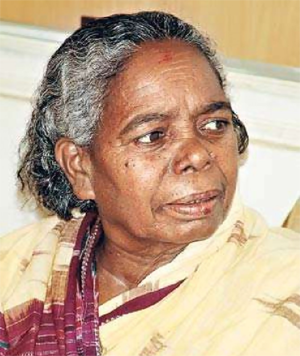
Padma Shri Tulasi Munda was born exactly a month before India won independence from the British. Born into a poor illiterate Adivasi family from one of the most backward regions of Orissa , she grew up with her own notions of freedom and slavery that were strikingly different from the beliefs held by the people in her milieu - Tulasi wanted to study. She wanted to educate herself, learn new things, and speak exciting languages like Hindi and English.

As the youngest of the four sisters and two she yearned to study, but it was a futile desire. There was no school in their village, Painsi. In any case, nobody in the area educated their girls. When she was about 12 years old she went to live with her sister in Serenda, 65km. away. There she earned Rs. 2 a week by cutting stones, sifting iron from the waste but whenever she could, she taught herself the alphabets. It was difficult, but she plodded on.

The turning point came in 1961 when she met Vinobha Bhave and was inspired by his vision and commitment to donate land (Bhoodan) and improve the lives of poor villagers. She participated in their village forays and struggles in different parts of the country.
In 1964, she returned to Serenda her village. Her mission in life was clear. A victim of illiteracy, she would dedicate her life to eradicating this plague. Illiteracy, she believed was the worst form of enslavement. It was the root cause of the evils she saw all around her. Poverty, unemployment, drunkenness, superstition, fear were rampant in rural Orissa and she firmly believed that Education was the tool to free people’s minds from the darkness of ignorance.

It was not easy -as she anticipated the villagers found the concept of educating girls preposterous. But Tulsi Munda was undeterred, even though she had neither students nor a venue for that matter. She persuaded Serenda’s local headman to lend her the use of his verandah for a few hours. As children worked during the day, she started evening classes. It began slowly but before she knew it, she had 30 children. She taught them the basics. Just alphabets and numbers and a smattering of English words. She believed even if he grew up to be driver, a few words English would help him to get a better job in Bhubaneshwar or even Kolkata. In the coming 40 years she helped establish 17 schools and succeeded in educating 20, 000 boys and girls. Currently, she has over 500 students, almost half of whom are girls and her school provides education all the way up to class X.

A self-made educationist, Tulasi ardently believes the goal of education is to improve life, to make things better around us, to do things better. She believed through education and girl empowerment issues like superstition, lack of hygiene, drunkenness, wife-beating and all sorts of backward thinking could be eradicated. All of life’s important issues whether it is the rights of women, children or Adivasis can be tackled better if people have a higher level of education. “The goal of education is to improve Life, to make things better around us, to do things better” and for her efforts in Tribal empowerment Tuslasi Munda received the Padma Shri in 2001 by the Government of India. She still continues to run schools under the aegis of her organization Adivasi Vikas Samiti for the downtrodden rural Orissa people as she feels that this is just the beginning…



